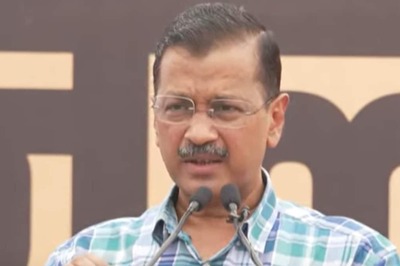
views
New Delhi: Sitting near the mud stove in her makeshift semi-pukka house on the banks of the Yamuna, Rani Das is wondering what if the lockdown is extended. Does she have enough ration to feed her family?
For now, she has enough rice, flour and sugar which will help them have two meals each day for another week.
Rani's family is one among such 140 households in the Hindu Refugee camp near Gurudwara Majnu Ka Tila. Most of them fled their homes in Pakistan, escaping discrimination and religious persecution, and came to India between 2011 and 2013.
"But there is very little of lentils and vegetables left. There is no money, so there is no gas. The policemen are not letting us collect firewood from the banks of the river," Rani says, as she flips a sugar-stuffed roti on the hotplate.
"We don't have fodder for our famished cows. Earlier, we would collect it from the jungle. Now, even that is now allowed due to the lockdown," she says, adjusting the only small wooden log inside the ‘chulha' to keep the fire burning.
Rani's daughter-in-law Jamuna is pregnant with her first child and has been eating just two meals a day -- mostly sugar-stuffed roti or rice with salt and ‘green chutney'.
Her neighbour, Gomti, 52, says a few people came to them with cooked food but the residents of the camp did not take it, fearing it might spread the coronavirus in the locality.
"How do we know it is safe? We do not have a machine, which they show on television, to ascertain if it has the virus," she says.
Gomti says her family will choose to have "noon-roti" (salt and roti) or die of starvation, rather than get infected.
"We saw it on mobile phone, even the families of those dying due to coronavirus do not accept the bodies and cremation grounds return them," she says.
Dharamveer, 42, the ‘Pradhan' or community representative, says most men in the camp earn their living doing odd jobs.
"All the daily wagers, agricultural labourers, and those who sell mobile covers on the roadside are out of work," he says.
"Some people came here with cooked food but we did not accept it. We can cook our food on our own. All we need is that credible government agencies give us dry ration," Dharamveer, who has been leading the fight for India citizenship for community members, says.
"There is no soap. How do we wash our hands? We have been wearing the same clothes for 3-4 days on the trot," he says.
Dharamveer says the policemen had been asking them not to go to vegetable markets or even to the wheat fields across the Yamuna to find some work.
"They are right. Death due to hunger is much better than this disease. If one person catches the virus, it will lead to the death of everyone in the camp," he says.
Sukhnandan, who is watching epic 'Ramayana' on his battery-operated television, asks, "Is it possible one or two residents can get curfew passes so that they can go out and buy essentials for everyone?"
"Police say application for passes are being processed online. We do not know how to do that," he says.




















Comments
0 comment